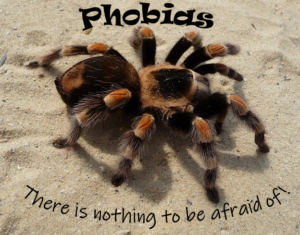What are you afraid of?
Maybe it’s arachnophobia (the fear of spiders) or a fierce case of acrophobia (a fear of heights). There’s another common phobia that we don’t hear much about, but we may all suffer from to a certain degree…
food neophobia!
(or the fear of eating new or unfamiliar foods).
Yes, there is an actual name for it!
Food neophobia is most common in young children, but often carries over into adulthood. In our coaching tip, Where the Magic Happens!, we mentioned all the foods we THOUGHT we didn’t like. Mushrooms, Brussels sprouts, avocados, eggplant, among many others. While we didn’t know it at the time, we were likely suffering from food neophobia. We had an underlying fear of even trying these foods!
Think about family gatherings. Do the same dishes show up over and over? If so, why is this? Could it be a result of all of our collective food neophobias working together and influencing what we serve at these get-togethers?
There are a couple of possible causes of food neophobia:
 One is…and this is a BIG one…children modeling the behavior they see from their parents. If kids hear mom or dad (or another adult) say, “how do people eat beets…they taste like dirt,” the kids will now have anxiety (or fear) of trying them. Even if they try it, what are the odds they will like them? Chances are, they have made up their mind and think they won’t like it even before it hits their mouth!
One is…and this is a BIG one…children modeling the behavior they see from their parents. If kids hear mom or dad (or another adult) say, “how do people eat beets…they taste like dirt,” the kids will now have anxiety (or fear) of trying them. Even if they try it, what are the odds they will like them? Chances are, they have made up their mind and think they won’t like it even before it hits their mouth!- Past experiences! Other possible causes of food neophobia include prior unpleasant experiences with foods. For me, it was mushy Brussels sprouts cooked in the pressure cooker, slimy mushrooms out of a can, and pickled beets on the salad bar. I had no idea how delicious these foods could be when you roast them in the oven. Even worse, maybe you had a case of food poisoning. Our daughter got sick after eating a pasta dish at a local restaurant several years ago. The thought of eating that meal again (or even eating at that restaurant) makes her a little queasy. These past experiences can add heightened anxiety to new experiences. For some, trying a new food may be fun and exciting, while others may have a difficult time coping with the DANGER signals these new experiences produce.
 The problem with food neophobia is it limits the variety and nutritional quality in your diet. If you only eat what’s in your comfort zone and part of your normal routine, you are missing out on some fantastic food experiences…as well as important nutrients that can help protect you against illnesses like cancer, diabetes and heart disease.
The problem with food neophobia is it limits the variety and nutritional quality in your diet. If you only eat what’s in your comfort zone and part of your normal routine, you are missing out on some fantastic food experiences…as well as important nutrients that can help protect you against illnesses like cancer, diabetes and heart disease.
The same is true, of course, for picky eaters, which include not only the refusal to eat unfamiliar foods, but the rejection of familiar ones as well!
So, what’s the treatment for food neophobia?
 Expose kids to a wide variety of REAL food starting at a young age! If you didn’t start them young, don’t worry, change can happen if you are consistent. The more they are exposed to REAL foods, the more they will come to like them!
Expose kids to a wide variety of REAL food starting at a young age! If you didn’t start them young, don’t worry, change can happen if you are consistent. The more they are exposed to REAL foods, the more they will come to like them!
- Remember, kids are always watching. If they are trying Brussels sprouts, make sure to show them how great they taste…heck, make an even bigger impact and go back for seconds!
- Think twice about pressuring kids to try new foods. The more pressure you introduce, the more anxiety the child may have about trying the new food. One idea is to give them two new foods and give them the option to eat one of the two. This lets them feel like they have SOME control of their choices.
- Use caution when using food as a reward. Using cookies as a reward for eating their broccoli can reinforce a perception that cookies are “good” and broccoli is “bad.” Try instead using an activity or experience as a reward.
- Try different preparations. You may not like turnips raw but throw them on the grill and they take on a sweet, caramelized flavor. Our kids didn’t like sweet potatoes until we roasted them in the oven. Now, they love them! Remember, foods can be prepared in a variety of ways — keep trying those “not so sure about” foods until you find a preparation or recipe you like!
 Be open-minded, get out of your comfort zone, and try something you THINK you don’t like! This can help make trying new things feel more comfortable. In our cooking demos, it is so fun to see people discover they actually like foods they THOUGHT they didn’t like. We recently made the Mediterranean Roasted Eggplant Pasta which is loaded with eggplant, mushrooms and olives. You should have seen their faces! When I asked “are you afraid of eggplant?” One woman responded, “I am scared of all these things!” They were open-minded, tried it and many discovered they DO LIKE those foods – prepared the right way! The fear has significantly diminished and they are now likely to try these foods again – after years of avoiding them!
Be open-minded, get out of your comfort zone, and try something you THINK you don’t like! This can help make trying new things feel more comfortable. In our cooking demos, it is so fun to see people discover they actually like foods they THOUGHT they didn’t like. We recently made the Mediterranean Roasted Eggplant Pasta which is loaded with eggplant, mushrooms and olives. You should have seen their faces! When I asked “are you afraid of eggplant?” One woman responded, “I am scared of all these things!” They were open-minded, tried it and many discovered they DO LIKE those foods – prepared the right way! The fear has significantly diminished and they are now likely to try these foods again – after years of avoiding them!
- Encourage family members and friends! What about suggesting a rule that the next family get together has to include items that haven’t been served at a gathering within the last year. Think about all the new – and probably fantastic – foods that will show up!
We hope this helps overcome any food neophobias you or someone you know may have! Think about it like this…what is the worst that will happen? Sure, you may decide that mushrooms or sweet potatoes are still not your favorite. But maybe it will help you discover an appreciation of certain foods. And you may find yourself saying, “I can’t believe I used to not like ___________.”
Most importantly, think of all the incredible food experiences you might be missing out on!





Funny story: My daughter got over her “fear” of salads when she was in the second grade. We went on a trip and had to wait forever for our main dish at a restaurant. She was so starving that she ate her entire salad. From then on, she always wanted a salad. She is a big salad eater to this day.